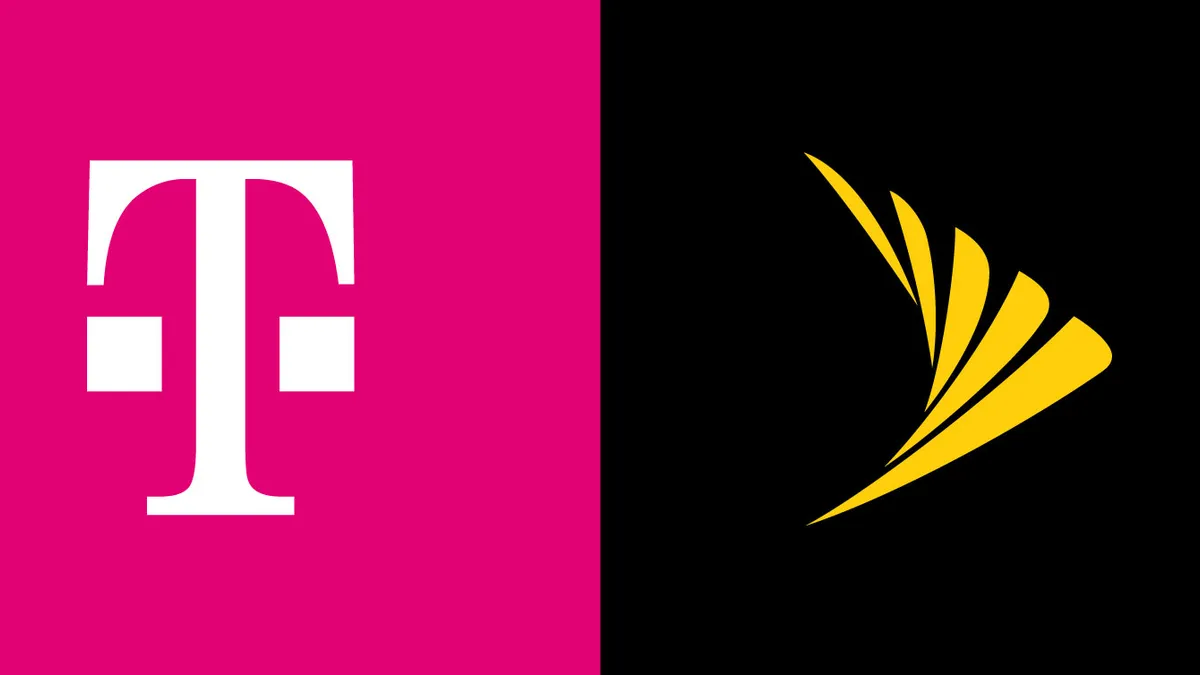Dive Brief:
- 5G networks were promised a major boost Friday by the U.S. Department of Justice (DOJ), which announced it would agree to allow the proposed $26 billion merger of Sprint and T-Mobile to proceed.
- DOJ's Antitrust Division required Sprint to divest its Boost Mobile, Virgin Mobile and Sprint prepaid phone businesses, while both companies will divest some wireless spectrum to satellite TV company Dish Network and make at least 20,000 cell sites and hundreds of retail stores available to the company. Dish will also be able to access T-Mobile's network for seven years. In a statement, DOJ officials said the settlement will "facilitate the expeditious deployment of multiple high-quality 5G networks for the benefit of American consumers and entrepreneurs."
- As part of the settlement, Dish confirmed it will become a wireless carrier, with a pledge to build out a 5G network that will reach 70% of the U.S. population by 2023. If it fails in that goal, the company will pay up to $2.2 billion in voluntary contributions to the U.S. Treasury. In a statement, Dish co-founder and chairman Charlie Ergen said it would "accelerate our work to launch the country's first standalone 5G broadband network."
Dive Insight:
Friday morning's announcement from DOJ represents a major step forward for this deal, which continues to clear regulatory hurdles. Already, Federal Communications Commission (FCC) Chair Ajit Pai has endorsed the deal, and after this latest announcement, he reiterated his belief that the merger will help "advance U.S. leadership in 5G and protect competition," and help close the digital divide with rural America. T-Mobile and Sprint have committed to building out a 5G network covering 99% of the U.S. population in the space of six years.
On T-Mobile's Q2 earnings call just hours after the DOJ's announcement, company officials ratcheted up the pressure on their leading competitors — AT&T and Verizon — in the race to 5G deployment. T-Mobile CEO John Legere said when it comes to 5G, Verizon is "clueless," with "no strategy, nowhere to go." He said AT&T is not as clueless as Verizon but are "liars" over its much-derided 5G Evolution, which critics say is simply a repackaging of 4G LTE wireless service.
But the deal is still under legal scrutiny from attorneys general from 13 states and Washington, DC, with the proposed merger unable to close before the case is resolved. During T-Mobile's earnings call, Legere noted the support of several state attorneys general — Kansas, Nebraska, Ohio, Oklahoma and South Dakota — for the DOJ settlement, and said the two sides will go to court for a meeting with the judge this week.
Legere said that the contents of the settlement "certainly will solve many if not all their concerns," and that he is "very confident" that the lawsuit will be either dismissed or found in favor of the merger.
"The messages that we're going to have to get back to, that are important to the constituents are: that jobs are going to go up every day in this new company; that prices will not go up; competition will go up; the build-out will be comprehensive and on-time and cover 99%," Legere continued. "Those are the messages we have to get back to, and those are the messages that were of concern to many of the states that were party to this and they can all be answered."
Critics remain unconvinced, however, that this deal will result in greater wireless competition in the U.S. Gigi Sohn, an ex-counselor to former FCC chair Tom Wheeler, called the move to allow Dish into the marketplace "centralized industrial policy engineering" and said it is a "mobile Frankenstein" that is not really a competitor as it relies on T-Mobile's network to operate. In a statement of her own, FCC Commissioner Jessica Rosenworcel said she remains "skeptical" of the merger leading to more competition.












